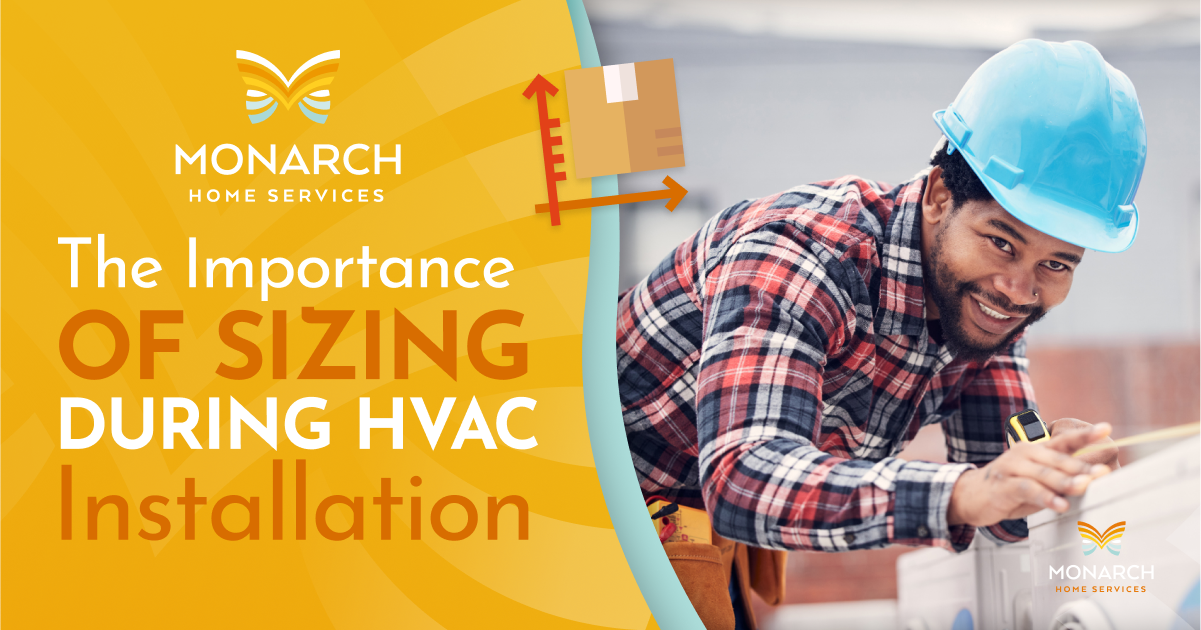
Sizing is one of the most important steps in HVAC installation. It ensures the system can perform efficiently and maintain your comfort. However, it’s not about the physical dimensions of the equipment (although any AC or heater must fit within a space and have enough room to maintain proper airflow). Sizing is about matching the right capacity for the conditioned space, so your investment in AC installation or replacement is worth it.
Why Does HVAC Sizing Matter?
Every air conditioning or heating system is designed to work for a specific area. This ensures it can provide consistent temperatures that match your preferences. British Thermal Units (BTUs) are used to measure an AC’s cooling capacity. For example, a 1-ton air conditioner removes 12,000 BTUs of heat per hour. A 1,200- to 1,400-square-foot home generally requires a 23,000 BTU air conditioner.
Square footage isn’t the only factor in sizing for HVAC installation (more on that later). However, too large a system won’t cool your home any faster, as many people believe. It’ll run in shorter cycles, which can affect temperature and humidity control and waste energy. Too small a unit will run continuously and never reach the ideal temperature, also increasing energy consumption.
In both cases, increased strain can wear out the system more quickly, potentially leading to frequent repairs and early replacement.
Nonetheless, various mistakes are often made during this step in HVAC installation:
- Guesswork: Guessing the size of an HVAC system is a bad idea. Don’t just go by someone’s assumption or recommendation; sizing a system requires precise mathematical calculations.
- Ignoring Ductwork: Even if your HVAC system is properly sized, mismatched ductwork will restrict airflow, reduce performance, and increase energy usage.
- Not Considering Future Requirements: The current layout of your home is important, but for your HVAC unit to have lasting value, plan for future changes or additions that may increase the load on the system.
What Is a Load Calculation?
A load calculation consists of a series of measurements to determine the ideal-sized HVAC system for your home. Square footage is only one variable it considers. A Manual J calculation starts with the size of the building and also takes into account the number and type of windows, how many people occupy the building, and the materials used for insulation. It also considers heat-producing appliances plus a structure’s airtightness and exposure to sunlight.
Calculations can be performed manually. However, an HVAC contractor has software to input numbers for specific variables. It then automatically reveals the size of the system that’s best suited for your home.
Factors In Determining Heating or Cooling Loads
Aside from the variables already mentioned, a technician must also consider the following during HVAC installation:
- Climate: In warm climates, ACs run in seasons besides the summer. Therefore, you can save energy by investing in a higher-SEER system. A Manual J calculation also considers the climate zone your home is located in.
- Exterior Properties: Heat absorption and reflection are impacted by the type of material on your home’s exterior and its color. An installer will consider whether it has lighter colors that reflect heat or brick that effectively absorbs and retains heat. Vinyl is an effective insulating material.
- Shade: Homes that face north or east tend to have more shade, so they are generally cooler. However, a south- or west-facing structure has more sun exposure and thus takes longer to cool.
- Ceiling Height: The higher a room’s ceiling height, the greater its volume and the more BTUs that are needed to cool it efficiently.
Benefits of Proper Sizing
Now that you know how sizing works during HVAC installation, these are some benefits you can expect by letting a professional take the time to complete this important step:
- Improved Comfort: A correctly sized air conditioner or heater maintains the desired temperature and helps control humidity. If not, your home may feel stuffy on a hot day. This is a common issue with oversized units; they don’t run long enough to remove enough moisture. The lack of circulation can make the air feel stale.
- Increased Energy Efficiency: Too small an HVAC unit will run too long, drawing more energy. Even the short cycling that’s common with too large a system will waste energy. Therefore, proper sizing is important for achieving optimal energy consumption.
- Fewer Repairs: If an HVAC system isn’t the right size for your home, it will work too hard. The strain on its components will cause them to wear out much faster than they normally would. This can lead to unexpected breakdowns and chances are you’ll have to deal with more frequent, costly repairs.
- Longer System Life: A well-maintained HVAC system can last 15 to 25 years. That’s a significant amount of time between investments. However, a poorly sized system will wear out much more quickly. Once major components start to fail, you’ll have to replace the entire system, so sizing can save you thousands of dollars.
- Better Indoor Air Quality: If an HVAC unit can’t effectively control temperature, humidity, or air circulation, you’re home will have indoor air quality issues. Aside from higher humidity, it may be dustier and dirtier. A correctly sized system can reduce particulates and avoid issues such as increased allergies, mold, and damage to wood and other sensitive materials.
Schedule an HVAC Load Calculation with Monarch Home Services
Our NATE- and EPA-certified technicians are familiar with every aspect of HVAC installation. Whether you need an air conditioner or heater replacement in Bakersfield or Fresno, our team can assess your home and recommend the best type and size of the system. We install traditional heating and cooling systems, heat pumps, mini-splits, ductless systems, and the latest solar and geothermal equipment. Maintenance agreements are also available to ensure your HVAC system is inspected and tuned up each year. To schedule service, contact us online or call (661) 215-6737.

